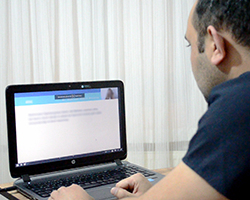Syrian health workers in Turkey advance skills through distance learning during COVID-19

WHO
Syrian health-care personnel in Turkey play a crucial role in facilitating access to essential health-care services for Syrian refugees and migrants, and in helping them overcome cultural and linguistic barriers. To support their professional development, training for Turkish and Syrian health-care personnel has been made accessible via a distance learning platform during the COVID-19 pandemic.
With the contribution of distance learning experts, the previously developed training content was restructured to create an accessible, user-friendly and interesting e-learning experience. The plan to continue this vital training was initiated by the WHO Country Office in Turkey in cooperation with the Turkish Ministry of Health, with funding provided by the European Union (EU) within the scope of the “Improved access to health services for Syrian refugees in Turkey” project.
“The EU has allocated €780 million to improve the health status of refugees in Turkey,” says Libor Chlad, Counsellor and Head of Section of the Facility for Refugees in Turkey at the EU. He emphasizes that “apart from our flagship cooperation with the Turkish Ministry of Health in providing free-of-charge health care, we have partnered with WHO to provide continuous education to doctors and medical professionals from Syria, as well as their Turkish peers, to ensure high standards of care. We will continue to work with the Ministry of Health and WHO with a view to fully integrating these health professionals into the Turkish health system for the benefit of everyone”.
User experience underscores the platform’s success
The content provided through the distance learning platform is continuously extended and enhanced. Dr Altin Malaj, Refugee Health Programme Coordinator for the WHO Country Office in Turkey, stresses that the platform is the first of its scope and size in the WHO European Region. Some of the topics covered on the platform include: the Mental Health Gap Action Programme, noncommunicable diseases, early childhood development, psychosocial support training in disasters, medical record systems, and occupational health and safety – with Turkish and Arabic language options available throughout.
Dr Ramy Sheikhmuhammed, one of the participants of the distance learning platform expressed his appreciation by highlighting the accessibility and sustainability of the platform: “I find it very important to refresh and consolidate our existing knowledge, and we have the opportunity to access this training content over and over again”.
Training Consultant, Dr Özlem Onar from the WHO Country Office in Turkey, recognizes that “thanks to the distance learning platform we have initiated, we will be able to use both training models together after the pandemic, and I believe this will enhance our training provision and sustainability”.
Online learning as effective as face-to-face training
Another participant, Dr Ali Ummahan from the Ankara Refugee Health Training Centre commented, “I believe the training is at least as beneficial as it would have been face-to-face,” on his experience with the distance learning platform.
Based on the evidence, Dr Ali’s insight is correct. The distance learning platform offers a similar learning success when compared with face-to-face training results. Dr Akfer Karaoğlan Kahiloğulları, Project Manager for Mental Health at the WHO Country Office in Turkey, draws attention to the effectiveness of the platform: “What makes this online training unique is its success rate, which is similar to face-to-face training. Evidence-based results show that this online training is highly beneficial for the continuous medical training of both Syrian and Turkish health-care workers providing primary health care services”.
Elaborating on these findings, Dr Malaj concludes that, “the capability of the platform is carefully documented with progress reports on attendance and completion rates, as well as pre-tests and post-tests measuring the knowledge gain of the trainees, attributable to the training programmes”. He notes that the data strongly suggests that this online training platform works well and will contribute to strengthening the capacity of Syrian and Turkish health professionals to provide essential and quality health services to Syrians under temporary protection in Turkey.



